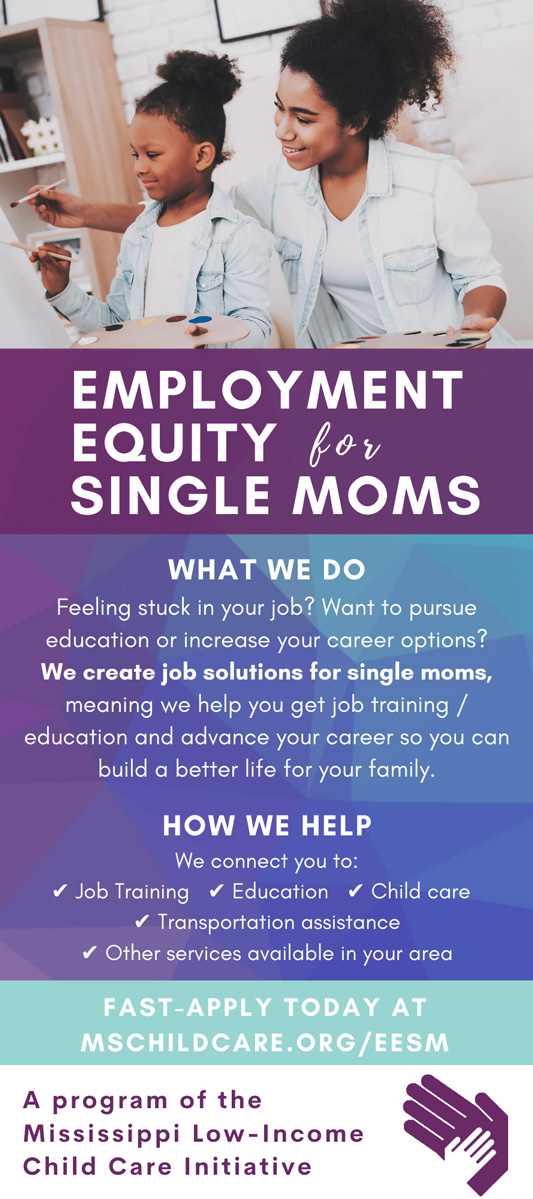In recent weeks, Mississippians have seen headlines and op-eds going back and forth about the economic costs of fatherlessness in Mississippi. While no family structure may look alike, one thing is indisputable: Strong, resilient mothers are the bedrock of family life in Mississippi by every measure.
How many of us know single moms who work more than one job; who take multiple shifts at inconvenient hours because of child-care responsibilities; who navigate through a never-ending minefield of obstacles to sustain their family’s well-being; who tamp down their own distress while providing an example of persistent endurance, love and compassion to their children?
In our state, single parents (mostly mothers) are raising nearly 50% of all children. In fact, Mississippi has one of the highest rates of children in single-parent families in the nation, the Annie E. Casey Foundation reports. By some estimates, Mississippi has the highest rate of single mom-headed households in all the U.S. Mississippi also has the second highest share of women living below poverty, and poverty is much higher in families headed by single moms. Families with school-age children in Mississippi experience some of the highest poverty rates in the nation, at 23.3% based on 2020 Census data. But in Mississippi’s single mom-headed families, the poverty rate doubles to an alarming 47.6%. This is not due to a lack of work.

The National Women’s Law Center reports that women are half of Mississippi’s workforce (about 49%), yet they are 2.6 times more likely than men to be in a low-wage job, and they are 71% of workers in the low-wage workforce.
Single mothers’ work ethic is incredible and hasn’t wavered. Mississippi has one of the lowest overall labor-force participation rates in the nation (approximately 56%), but single mothers with children ages 0-14 participated in the labor force at a rate of 77.7% in 1977, 85.4% in 2000 and 81.1% in 2019. Even after the COVID-19 pandemic wreaked havoc on the labor market and on critical support systems like center-based child care, the Committee for Economic Development reports that the single-mother labor-force participation in Mississippi was 75.3% in 2021.
Single mothers in Mississippi work, but they are stuck in low-wage jobs with too few resources to support their efforts in pursuing a higher-wage career.
Mississippi: Worst State for Single Mothers
Despite high poverty rates and a disproportionate share of low-wage workers, more than half of all mothers in Mississippi (50.4%) are the primary or sole breadwinners for their families. Another 23.7% of mothers are co-breadwinners. This is the second highest rate of women breadwinners in the U.S., with 74% of Mississippi mothers being the primary, sole- or significant co-financial contributors in their households.
We find real-life examples of single mothers in Mississippi—who collectively keep this ship running in the face of insurmountable circumstances—daily in our work with child-care providers and single moms pursuing employment or education opportunities.
An Army veteran escaping a bad relationship, coming home to Mississippi to work and enroll in school to become a teacher can’t get access to child-care assistance because the Mississippi child-support enforcement policy is so rigid. So an agency’s paperwork mistake left her out of compliance at no fault of her own, derailing her efforts.
A single mother of three working to complete her clinical phase and final requirements to obtain her LPN degree has to drive to three different towns—one to work, one for class and another for clinical. But with her car payment two months past due, a repossession looms and would mean the inability to finish her degree, and she hasn’t come up with leads on help.
A mom escaping domestic violence moves to Mississippi from another state to save herself and her child, yet she is re-traumatized at every stage of trying to get help with food and child care costs. She has to allow the State of Mississippi to pursue child-support enforcement before she’s approved, providing sensitive information about the father and further entangling herself with her abuser.
In spite of single mothers’ incredible efforts to sustain their families, Mississippi has been ranked as one of the worst states for working moms across categories including child care, professional opportunities and work-life balance.
Invest in Child Care To Support Single Mothers
Mississippi taxpayers can support three priorities that will improve the lives of single mothers and nearly half the children in Mississippi they are currently raising. A preponderance of evidence shows investments in child care yield an overwhelmingly positive economic benefit for the direct recipients of such programs, but also for the taxpayer over the long term. Every $1 spent on early care and education is estimated to generate $3 in cost savings, the Urban Institute reports.
First, we need to use every dollar we can on child-care assistance to serve as many families as possible. Making this a priority both improves mothers’ economic security and gives young children access to early childhood education.
Mississippi has an additional $200 million in the American Rescue Plan Act’s child-care funds. Every dollar should be spent as expeditiously as possible to support working moms and moms in training or education. We know if Mississippi provided child-care assistance to all families eligible under 150% of the poverty level, an additional 10,900 families and 29,700 children would gain access to child care, 4,800 additional mothers would join Mississippi’s labor force, and 7,000 children would be lifted out of poverty.

Second, we need to remove State of Mississippi-imposed red tape from the child-care assistance application process that creates a barrier for too many moms (like Mississippi’s Child Care Payment Program). This includes easing requirements in the application process, like giving moms the choice whether they pursue child-support enforcement and expanding who qualifies to those who are actively looking for work.
Other needed strategies include making child-care assistance application navigators part of every entry point where single moms and their families receive services from Mississippi. And while we’re at it, just advertising the child-care program statewide and how to apply would go a long way.
Third, we need to put the full weight of Mississippi’s collective resources behind programs and strategies designed to pull single mother-headed families out of poverty. This strategy would impact two generations simultaneously and is immeasurably beneficial.
Single mothers hold it all together in the face of falsehoods about who they are, as they endure policies that are dehumanizing and a labor market that exploits their vulnerabilities. This reality is not a rare exception, but the norm for so many Mississippi families. We can change this.
This MFP Voices essay does not necessarily represent the views of the Mississippi Free Press, its staff or board members. To submit an essay for the MFP Voices section, send up to 1,200 words and sources fact-checking the included information to azia@mississippifreepress.org. We welcome a wide variety of viewpoints.






